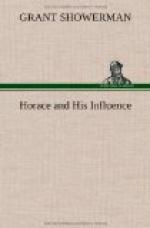No, life may have its inevitable pains and its inevitable end, but it is far more substantial in composition than a bubble. For those who possess the secret of detecting and enjoying them, it contains solid goods in abundance.
What is the secret?
The first step toward enjoyment of the human lot is acquiescence. Of course existence has its evils and bitter end, but these are minimized for the man who frankly faces them, and recognizes the futility of struggling against the fact. How much better to endure whatever our lot shall impose. Quintilius is dead: it is hard; but patience makes lighter the ill that fate will not suffer us to correct.
And then, when we have once yielded, and have ceased to look upon perfect happiness as a possibility, or upon any measure of happiness as a right to be demanded, we are in position to take the second step; namely, to make wise use of life’s advantages:
M_id all thy hopes and all thy cares,
mid all thy wraths and fears_,
T_hink every shining day that dawns the
period to thy years_.
T_he hour that comes unlooked for is the
hour that doubly cheers_.
Because there are many things to make life a pleasure. There is the solace of literature; Black Care is lessened by song. There are the riches of philosophy, there is the diversion of moving among men. There are the delights of the country and the town. Above all, there are friends with whom to share the joy of mere living in Italy. For what purpose, if not to enjoy, are the rose, the pine, and the poplar, the gushing fountain, the generous wine of Formian hill and Massic slope, the villa by the Tiber, the peaceful and healthful seclusion of the Sabines, the pleasing change from the sharp winter to the soft zephyrs of spring, the apple-bearing autumn,—“season of mists and mellow fruitfulness”? What need to be unhappy in the midst of such a world?
And the man who is wise will not only recognize the abounding possibilities about him, but will seize upon them before they vanish. Who knows whether the gods above will add a tomorrow to the to-day? Be glad, and lay hand upon the gifts of the passing hour! Take advantage of the day, and have no silly faith in the morrow. It is as if Omar were translating Horace:
“W_aste not your Hour, nor in the
vain pursuit_
0_f This and That endeavor and dispute;_
B_etter be jocund with the
fruitful Grape_
T_han sadden after none, or bitter, Fruit._
“A_h! fill the Cup: what boots
it to repeat_
H_ow Time is slipping underneath our Feet:_
U_nborn tomorrow, and dead
yesterday,_
W_hy fret about them if today be sweet!"_




